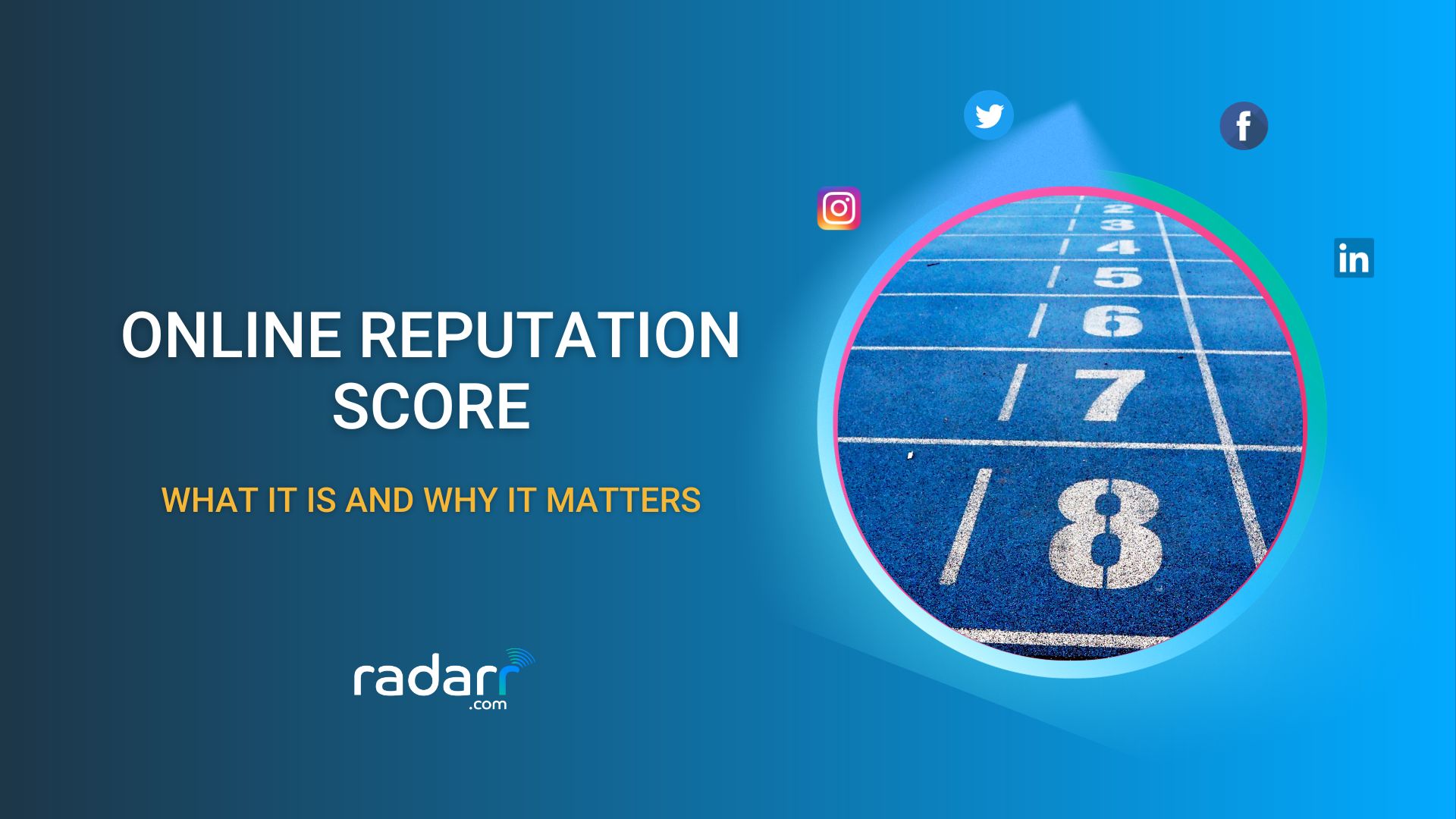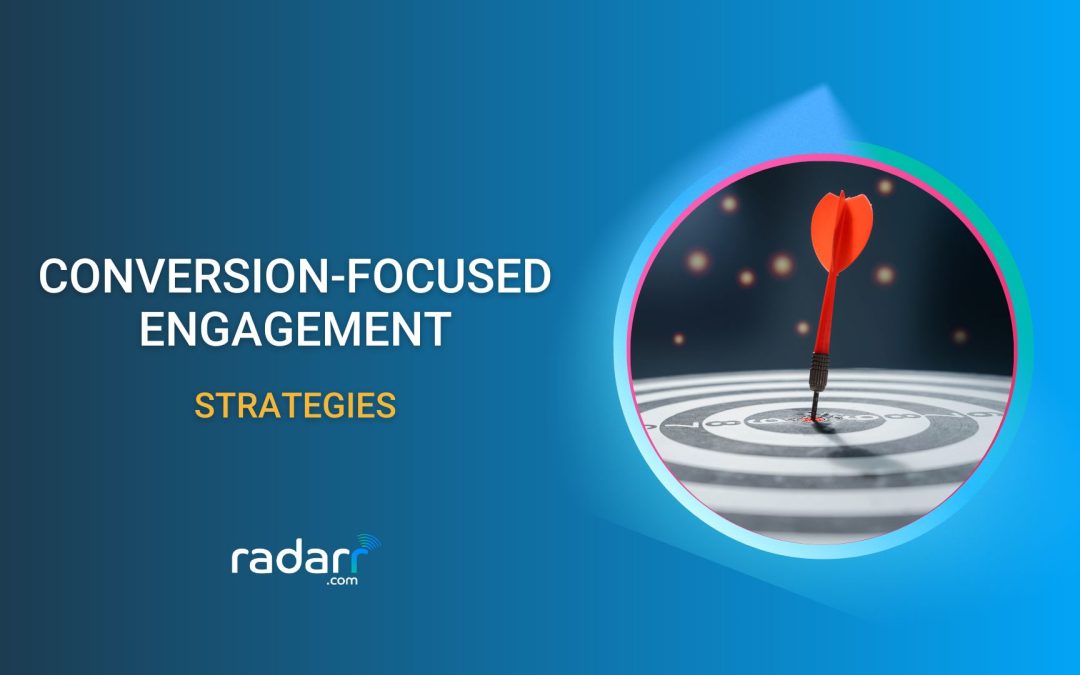In today’s digital age, an online presence is crucial for brands. However, it’s equally essential to manage that presence effectively. The wrong word or sentiment circulating online can have a detrimental impact on your business.
This is where your online reputation score comes into play. Understanding and actively managing it is a fundamental aspect of maintaining a positive and influential digital image.
In this blog, we’ll delve into everything you need to know about your online reputation score and why it matters for your brand’s success.
What is an online reputation score?
An online reputation score for brands is a metric measuring the public perception and credibility of a company in the digital space. It amalgamates diverse data points from social media, review platforms, news articles, and online content to evaluate the brand’s image.
Factors like customer feedback, social engagement, search engine rankings, and mentions influence this score. A high score often signifies a positive and influential online presence, while a lower score may indicate potential concerns or areas for improvement.
Why should you monitor your online reputation score?
Here are some reasons why monitoring reputation scores is important for online reputation management.
1. Competitive advantage
Keeping an eye on your online reputation helps understand how your brand compares to competitors. By analyzing your strengths and weaknesses in the digital landscape, you can identify unique selling points, capitalize on strengths, and address weaknesses, creating an edge over competitors.
2. Brand loyalty
Monitoring your online reputation enables you to respond promptly to feedback, whether positive or negative. Engaging with your audience, resolving issues, and acknowledging praise helps build trust and credibility, ultimately fostering strong, loyal relationships with your customers.
3. Consumer insights
Observing your reputation score provides a wealth of information about consumer sentiments. By analyzing feedback, comments, and reviews, you gain valuable insights into what customers like, dislike, and expect. This information is a goldmine for product improvements, service enhancements, and understanding market trends.
4. Business decisions
The data derived from monitoring online reputation guides critical business decisions. Whether it’s about launching a new product, refining marketing strategies, or making improvements in customer service, the insights obtained from reputation monitoring serve as a compass for shaping effective business strategies and making informed decisions that resonate with your target audience.
What are the factors that impact reputation score?
Here’s a breakdown of how each factor impacts a brand’s online reputation score:
1. Negative customer reviews
Customer reviews play a pivotal role in shaping an entity’s online reputation. Negative reviews, especially if they are frequent or widely visible, can significantly damage a brand’s image. They directly influence how potential customers perceive a company’s products or services.
A series of adverse reviews can create distrust, impacting consumer decisions. Monitoring and addressing these reviews constructively is crucial for maintaining a positive reputation.
2. Negative press coverage
Media has a considerable influence on public perception. Negative press coverage, whether in news articles, blogs, or influential online publications, can swiftly impact how a brand is viewed by the public.
Such coverage can magnify issues, causing widespread damage to a brand’s reputation. It’s essential to manage these situations effectively, providing accurate information and addressing concerns to mitigate the impact on reputation.
3. Social media crises
Social media crises have the potential to quickly escalate and cause significant damage to an entity’s reputation. These crises often involve rapid, widespread dissemination of negative information or feedback, leading to a loss of trust and credibility.
Responses during such crises are crucial; failure to address them promptly or inappropriately can intensify the damage. Brands need a well-prepared crisis management strategy to navigate such situations, minimize harm, and preserve their reputation.
4. Cyber attacks
Cyber attacks can have severe repercussions on an entity’s reputation. Security breaches and data compromises not only threaten sensitive information but also erode consumer trust. If a brand fails to protect its systems or customer data, it can result in significant reputational damage.
Transparent communication about the incident and robust measures to rectify and prevent future attacks is critical to restoring trust and safeguarding reputation.
5. Poor customer service
Customer service plays a crucial role in shaping a brand’s reputation. Instances of poor service, unresolved complaints, or unaddressed issues significantly impact customer perception.
Negative experiences shared by customers can influence others, affecting the brand’s image. Consistent efforts to improve service quality, prompt issue resolution, and attentive customer care are essential to maintaining a positive reputation.
6. Listings
Accurate and up-to-date information on online directories and listings is fundamental for a brand’s credibility. Inaccurate or inconsistent listings can confuse potential customers and impact trust. Having consistent, accurate, and updated information across platforms ensures credibility and trustworthiness, positively impacting the reputation score.
How to calculate an online reputation score?
Calculating an online reputation score involves a comprehensive analysis of various factors. Here’s a breakdown of the processes and steps involved:
1. Sentiment analysis
This process involves evaluating the sentiment expressed in online reviews. Tools like Birdeye aid in quantifying reviews and determining whether the overall sentiment is positive or negative.
By assessing the tone and content of reviews, sentiment analysis tools help in gauging the general impression a customer would have when viewing these reviews. A mix of positive and negative reviews can complicate this determination, but these tools assist in providing an overall sentiment score.
2. Monitoring social media
Actively engaging in social media monitoring helps businesses understand public sentiment towards their brand. Social listening tools track comments, tags, and mentions across social platforms, providing an overview of how a brand is perceived online.
3. Analyzing customer feedback
Direct customer feedback through surveys or reviews gives an insight into areas needing improvement and what a business is excelling at. Insights obtained from customer feedback surveys are valuable inputs for the overall reputation score calculation. Analyzing these insights helps in understanding how customers perceive the brand, its products, and its services.
Combining the data from sentiment analysis, social media monitoring, and customer feedback analysis, businesses can create a composite view of their reputation. You can use an online reputation score calculator to aggregate these scores or sentiments from various sources to aid in generating an overall reputation score, allowing businesses to assess their online standing and make informed decisions to enhance their reputation management strategies.
How to improve online reputation score
Here are some tips for better online reputation management:
- Collect online reviews: Actively encourage customers to leave reviews about their experiences with your brand. More positive reviews can enhance your reputation. Engage with customers after a purchase or service and ask for their feedback.
- Grow social media profiles: Maintain active and engaging social media profiles. Regularly post relevant content, interact with your audience, and leverage social media platforms to showcase your brand’s personality and values. Expanding your presence on platforms that your target audience uses can enhance brand visibility and credibility.
- Respond to customer feedback: Address customer feedback promptly and professionally. Responding to both positive and negative feedback shows that you value your customer’s opinions and are committed to providing excellent service. Acknowledge their concerns, offer solutions, and express gratitude for positive feedback.
- Update listings: Ensure consistency and accuracy in your online business listings. Accurate and up-to-date information about your business, such as contact details, working hours, and addresses, builds credibility and trust with your audience.
- Monitor online presence: Regularly monitor your brand’s online presence. Use tools and software to track mentions, reviews, and discussions about your brand across various online platforms. Keeping an eye on your online presence allows you to quickly address any issues that might arise and maintain a proactive approach towards managing your brand’s reputation.
- Prioritize customer experience: Providing exceptional customer experiences is key. Make sure your products or services meet or exceed customer expectations. Happy customers are more likely to leave positive reviews and recommend your brand, significantly boosting your reputation.
- Ask happy customers for reviews: Actively ask satisfied customers to share their positive experiences by leaving reviews on platforms. Positive reviews serve as valuable endorsements for your brand and can significantly improve your online reputation.
- Create quality content: Produce and share valuable, informative, and engaging content relevant to your audience. Quality content, such as blog posts, videos, or infographics, not only showcases your expertise but also attracts and retains a loyal following, enhancing your reputation as an authority in your field.
- Work on your website’s design and functionality: A well-designed and user-friendly website contributes to a positive reputation. Ensure that your website is visually appealing, easy to navigate, and mobile-responsive. A seamless user experience reflects positively on your brand, encouraging visitors to engage and trust your brand.
- Engage your employees or CEO: Encourage your team, including executives like the CEO, to be active advocates for the brand. Engaged employees can contribute positively to your reputation. Highlight their expertise, share their insights, and foster a culture that emphasizes transparency and dedication to the company’s values and customer satisfaction.
Recommended read: How to Create a Online Reputation Management Policy and Ensure It is Followed
Conclusion
Radarr serves as a valuable tool, enabling real-time monitoring of online conversations surrounding your brand and offerings. With Radarr, timely responses and proactive reputation management become achievable, fostering a positive online presence. Some of its top features are:
- Campaign Tracking & ROI
- Brand, Competitor and Crisis Monitoring
- Real-Time Alerts & Industry Trends
To experience the benefits of Radarr firsthand, book a demo today.
Frequently asked questions
How to find online reputation scores?
Discover an online reputation score by consolidating data from reviews, social media, and search visibility. It’s an assessment of an entity’s digital standing derived from multiple online sources.
What is a good online reputation score example?
A good online reputation score example surpasses 600, signaling a positive reputation. While an industry-standard hovers around 525, exceeding 600 sets a company apart and signifies a robust, positive trajectory.












